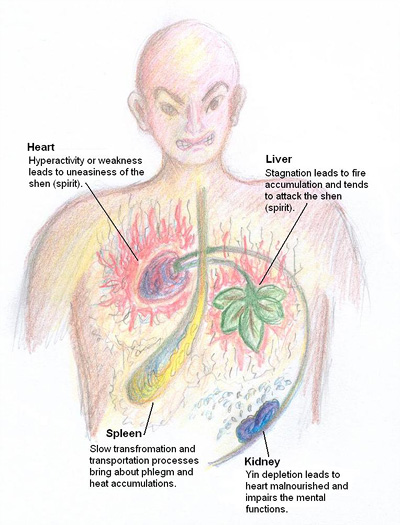How TCM Views the Development of Insomnia
Insomnia is inadequate or poor-quality sleep due to one or more of following:
 |
difficulty falling asleep; |
 |
shallow sleep or dream-disturbed sleep; |
 |
waking up frequently during the night and difficulty returning to sleep; |
 |
waking up too early in the morning; |
 |
inability to sleep at all during the night. |
As early as the Han dynasty (AD 206 - 220 BC), TCM has records about the development of insomnia, the Suwen (The Book of Plain Questions) states: "disharmony of the stomach leads to insomnia," which refers to improper dietary habits; the Jinkui Yaolue (Summary from the Golden Chest) explains that insomnia is due to the deficiency caused by overwork or anxiety. Modern TCM holds that insomnia has many possible causes, including mental distress, poor lifestyle habits, physical problems and medications. When the internal harmony is disturbed, the stability of shen (spirit) inside the heart is affected and insomnia will then occur.
Among the correlations between the organs and mental functions; the heart is the most important as it houses the shen; the kidney governs the storage of jing and promotes it transforming into marrow in the brain; the spleen acts as the nourishing source of mental activity; the liver governs the flow and discharge actions that regulates mental activity directly; and the gallbladder governs some important aspects of mental functioning such as decision making. Insomnia may follow when these organs are in disharmony.
Generally, the following contribute to the development of insomnia:
1. Mental distress
Anxiety and anger impair the normal functions of the liver, resulting in liver-qi stagnation. The stagnated qi transforms into fire evils and tends to attack the shen (spirit). Emotional extremes also induce the heart to form fire evils. When the spirit becomes irritable, insomnia will result. Furthermore, TCM believes that fear or other emotional stress gradually makes the heart and gallbladder weaken leading to wandering of the spirit and poor sleep. Excessive thinking or mentally exhaustion damages the heart and spleen, consumes the fundamental substances, resulting in an inadequate nutrient supply for the spirit, and thus in the development of insomnia.
2. Improper diet
Overeating, eating too much hot and spicy food, dried/fried foods or too heavy/greasy food can damage the spleen and stomach systems, which leads to slow transformation and transportation processes within the body. The retention of food will bring about phlegm accumulation and the development of heat evils which travel upwards to induce insomnia.
3. Physical weakness
Constitutional weakness, aging or major illness will all bring about kidney damage. Once there is disruption between heart and kidney, pathological conditions will occur. The depleted kidney-yin will not be able to nourish the heart, leading to hyperactivity of the heart and mental impairment. In addition, major blood loss or inadequate blood production will lead to heart weakness, which leads to uneasiness of the shen (spirit). If a weak and timid person is shocked by a sudden event, for example, their heart-qi will be greatly disturbed, resulting in dysfunction of the shen (spirit) and thus sleeping difficulties.
4. Imbalance between work and rest
TCM believes that overwork consumes excessive fundamental substances, while a too much leisure causes dysfunction of the spleen which leads to poor transformation and transportation from that organ. In either situation, the body's supply of essence, blood and other fundamental substances cannot maintain a stable shen (spirit), so sleep problems are likely to occur.
Generally, insomnia can be induced by many factors, mostly associated with mood and mental stress, diet, blood and qi deficiencies. These cause internal disturbances, non-smooth circulations and an imbalance of yin and yang. The main lesion is in the heart, and may also accompany spleen, kidney, liver, gallbladder and stomach disharmonies. Clinically, physicians classify insomnia into two major types:
 |
Deficient type: the shen (spirit) is undernourished, such as having insufficient blood or qi. |
 |
Excess type: the shen (spirit) is irritated by pathogens, such as phlegm, fire and dampness as well as blood stasis. |
 |
How traditional Chinese medicine views the development of insomnia |
|